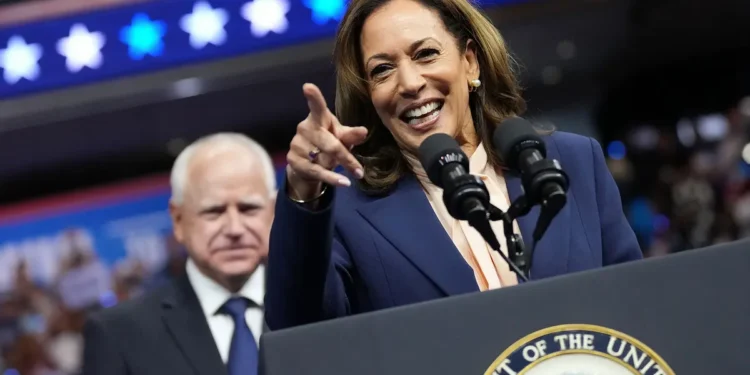On a warm Saturday in Mecklenburg County, North Carolina, Matt Taylor, a corporate bankruptcy attorney, embarked on an important mission. Pushing a stroller with his 15-month-old daughter, whose shirt read “I CAN’T VOTE, BUT YOU CAN,” he began canvassing a neighborhood filled with potential voters. “Nobody slams a door on a baby,” he remarked, hoping to reach Democrats who hadn’t participated in the 2020 election.
Mecklenburg County, home to Charlotte and a critical region for Democratic efforts in North Carolina, has a troubling history of low voter turnout. Taylor’s goal was to connect with approximately 40 registered Democrats and unaffiliated voters who abstained from voting two years prior. Local leaders believe that increasing turnout here could significantly impact the state’s electoral outcome in 2024. Drew Kromer, the chair of the county’s Democratic Party, described it as a “gold mine” for electoral change, akin to pivotal counties in other swing states.
Since taking office in April 2023, Kromer has revitalized the local party’s fundraising and volunteer efforts. Under his leadership, the Mecklenburg Democrats have significantly increased their organizational capacity, mirroring the successful transformation of Huntersville’s local government from Republican to Democratic control. “What the local party has pulled off is pretty remarkable,” stated Congressman Jeff Jackson. He emphasized that their get-out-the-vote (GOTV) initiative is unprecedented in the county and could ultimately influence the presidential race.
However, challenges abound. The aftermath of Hurricane Helene has compounded difficulties, especially in areas that traditionally lean Democratic. Many in these regions exhibit complacency due to their history of Democratic dominance, resulting in lower turnout rates. Particularly in Precinct 200, where Taylor was canvassing, demographic factors and socioeconomic disparities have hindered voter engagement. Leah Smart, a senior organizer, noted that while this precinct isn’t easy to canvass, it’s crucial to reach these voters.
As Taylor moved from door to door, he encountered a mix of responses. Many houses were unoccupied, and some residents were simply unavailable. He continued to engage with anyone who answered, hoping to spark interest in the upcoming election. His dedication reflects a broader strategy among local Democrats to mobilize support, especially in underrepresented communities.
Kromer, who has always exhibited a strong sense of initiative, has made strides in boosting the local party’s infrastructure. After witnessing disappointing election results in 2022, he decided to run for party chair, motivated by a sense of urgency to address turnout deficiencies in Mecklenburg County. He viewed the county’s dismal turnout as an existential threat to the party’s viability.
Despite Mecklenburg having a higher number of registered Democrats than many other counties in North Carolina, turnout remains alarmingly low. In the last election cycle, turnout was just 45%, significantly trailing the statewide average of 51%. Kromer recognized that enhancing turnout here was critical for statewide Democratic candidates to succeed.
To illustrate his approach, Kromer initiated an experiment in Huntersville, leveraging community engagement and strategic campaigning. With significant fundraising support, he helped organize a slate of Democratic candidates who successfully flipped the town’s governance from red to blue. This victory served as a model for broader efforts across Mecklenburg.
In 2024, excitement is building, particularly around Vice President Kamala Harris’s candidacy. Kromer and his team are prepared to harness the enthusiasm and mobilize voters. The county party has grown from having no paid staff to employing 25 full-time workers, with thousands of volunteers actively engaging in canvassing and phone banking efforts. By early 2024, they had raised over $2.6 million, showcasing a newfound energy and commitment.
As Taylor continued his canvassing, he finally made a connection with a woman named Renee, who expressed her intent to vote for Harris. This interaction underscored the importance of personal engagement in driving voter turnout in Kamala Harris’ campaign strategy. Taylor’s efforts are part of a larger strategy to identify and activate supporters across Mecklenburg.
The stakes are high for Democrats in North Carolina. In the 2020 election, Biden lost the state by just over 74,000 votes, with Mecklenburg’s turnout playing a critical role. Kromer and his supporters believe that increasing voter participation by even a few percentage points could sway the election in their favor. Mark Jerrell, vice chair of the county board of commissioners, emphasized that “everything actually hinges on Mecklenburg” and its ability to enhance turnout.
While many see potential for success, skepticism persists. Some political analysts caution that improving turnout in Mecklenburg alone may not be sufficient to guarantee statewide victories. Challenges in other regions remain significant, and the path to electoral success may be more complex than a singular focus on Mecklenburg.
Nonetheless, the grassroots momentum is palpable. With concerted efforts, organized fundraising, and an engaged volunteer base, the Mecklenburg Democrats are hopeful that their strategies will yield results. They aim to create a lasting impact in the upcoming elections, aspiring to make Mecklenburg a critical player in North Carolina’s political landscape. As the campaign progresses, Taylor and others like him continue to knock on doors, striving to turn potential voters into active participants in shaping the future of their state.
This election has already seen many twists and turns with many characters enter the fray, so who knows how it will end…?
Discover for yourself how this election could effect the job market for American Workers:


